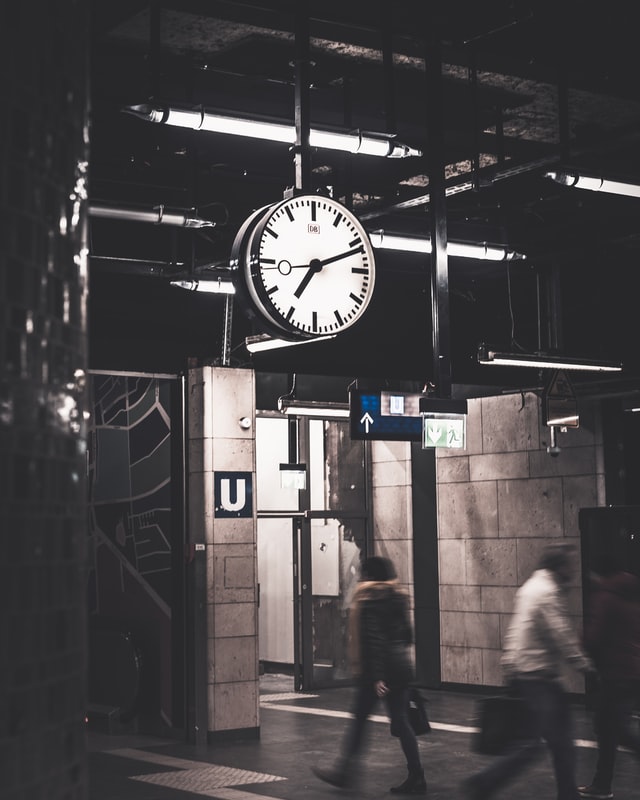The past few months living here in Texas, we’ve been in a sort of de facto experiment with our clocks. The main issue being a lack of clocks in the living room. If our phones aren’t near us, we don’t know what time it is. Most weekends I’m oblivious to the passage of times, resulting in regular stretches of getting lost in the pages of various books. Those are a rare two days where the hour doesn’t matter. As enjoyable as that experience is, most of the time it’s simply not realistic for daily life. For example, contrast the weekend’s idle passing with a normal weekday. During the week, we wake to an alarm and my husband leaves for work on time, checking his watch against the time on the stove’s display. I write at a computer, which obviously has the time. I start promptly at eight, and time my writing each day. In the afternoons, I read, I keep my tablet near to ensure I close the books in time to get to the gym ten minutes before class.
Living without an accurate timepiece is impossible today. Can one even imagine such an existence long-term? Even the term “long-term” is inherently rooted in time. It is the clock’s iron grip on our days, weeks, years which led Lewis Mumford to name it the most consequential invention in history.
“The clock, not the steam-engine, is the key-machine of the modern industrial age. For every phase of its development the clock is both the outstanding fact and the typical symbol of the machine: even today no other machine is so ubiquitous.”
Lewis Mumford, Technics and Civilization, 1934.
Mumford was an American historian and philosopher of technology. A native New Yorker, contemporary of Vannevar Bush and Frank Lloyd Wright, and frequent opponent of Robert Moses, Mumford’s ideas have influenced countless architects, urban planners, and sociologists. He wrote numerous books on the social dynamics of cities, and was the architectural critic at the New Yorker for thirty years. His most widely known work is, The City in Its History, which examines the role of technology in the success or failure of cities throughout human civilization.
One would indeed be hard pressed to find a piece of technology more influential or widely adopted. We rise according to the clock, work and rest according to the clock, relax according to the clock, eat and sleep according to the clock. Mumford went on to describe the clock like this, “the key machine of the modern industrial age…a piece of power machinery whose ‘product’ is seconds and minutes: by its essential nature it dissociated time from human events.” I think he is probably correct. When we think of time, we don’t think of a collective assortment of events, nor do we think of the passage of time in the abstract; we think in hours and minutes, precise measurements removed from the natural world.
The first mechanical clocks appeared in monasteries to signal prayer time. Monks in the Middle Ages invented the mechanical clock to keep time and signal prayer times throughout the day. This simple invention has gone on to influence modern nations and dictates the patterns of (most of) the world’s population.
Before the clock, work was done over the course of a day or week or season. Once we started tracking hours and minutes, it became possible to compute the hourly average, which turned into setting and meeting hourly quotas, which influenced salaries and wages. This transformed our economy from goods based to time based, and inevitably, shifted the importance from quality to quantity. It began to matter less how sturdy a chair a carpenter could craft, and mattered more how many that carpenter could produce.
Our ‘modern’ view linking inextricably with money is actually quite an old inheritance. In the 17th century, founding father Benjamin Franklin extolled us to, “Remember that time is money.” A century before him, though, the Puritans were scrupulous about using their valuable time on productive labor, being always fruitful so as to honor the Lord. While the Puritans weren’t concerned with becoming wealthy( riches were viewed as a temptation) they took care to always be effective in their appropriate and chosen profession. The Puritans, in Marxist historian Christopher Hill’s view, even banished holidays because they interrupted what they held to be the proper rhythms of work. Instead, they strictly adhered to the Bible’s outline of “six days shall you work,” and observed the Sabbath (on Sunday, not Saturday). Their forbidding of holidays was the Puritans’ push-back against the industrialization of England.
From Ben Franklin to Gordan Gecko to today’s “hustlers”, time as money continues to be the greatest preoccupation of most Americans. Transportation, office work, sports, recreation, wages, the flow of information are all measured according to the clock. The intense focus on the minutia throws us out of rhythm with nature’s ebbs and flows.
For all Proverbs’ admiration for the work ethic of ants, we don’t see timepieces strapped to the insects’ wrists. Nature progresses through seasons; she does not keep track of years or months passed. What might our days look like if we were less concerned with packing every minute with ‘productivity’ and more focused on embracing the seasons as they come? Like Thoreau before him and as Digital Minimalism author Cal Newport would echo decades later, Nature is not something to be overcome, but to utilize and embrace to our collective betterment. “Man’s great mission is not to conquer nature by main force but to cooperate with her intelligently but lovingly for his own purposes,” wrote Mumford.
While we haven’t yet broken down to place a clock in view of the living room, I do have a timepiece which stays with me most days; a watch I bought about two years ago. It has a classic brown leather band and a white face. I love how timeless it is. One technology melts into another, though. I wanted a watch so I could check the time without having to pick up my phone. I chose an analog watch specifically to avoid having yet another buzzing, tracking “smart” device. While the clock won’t disappear anytime soon, considering the out-sized role it plays in modern life reminds me to keep the hours in their place; as a measure, not as a carrot to chase.
Photo by Chris Smith on Unsplash




